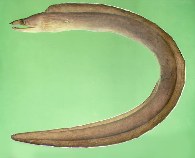| Family: |
Muraenidae (Moray eels), subfamily: Muraeninae |
| Max. size: |
120 cm TL (male/unsexed) |
| Environment: |
reef-associated; marine; depth range 5 - 35 m |
| Distribution: |
Indo-Pacific: from the Red Sea, Mauritius, and Chagos Archipelago, to French Polynesia; absent from Hawaiian Islands. |
| Diagnosis: |
Dorsal spines (total): 0-0; Dorsal soft rays (total): 0-0; Anal spines: 0-0; Anal soft rays: 0-0; Vertebrae: 137-142. The longest canines of the lower jaw are confined to the anterior third of the toothed area. Coloration is a uniform tan with a conspicuous white margin on the fins.
Description: Characterized by body depth at gill opening 14-23 in TL; relatively high dorsal fin; origin of dorsal fin about midway between corner of mouth and gill opening; anus anterior to middle of body; slender and hooked jaws; single row of three very long canines in front of upper jaw alternating with tiny teeth; median row of three elongate canines; side of jaw with inner row of lesser canines; front of lower jaw with outer row of small teeth inner row of three canines on each side; funnel-shaped tip of tubular anterior nostril (Ref. 90102). |
| Biology: |
Occurs in lagoon and seaward reefs (Ref. 9710). Solitary in crevices, usually seen at night (Ref 90102). |
| IUCN Red List Status: |
Least Concern (LC); Date assessed: 04 February 2009 Ref. (130435)
|
| Threat to humans: |
harmless |
Source and more info: www.fishbase.org. For personal, classroom, and other internal use only. Not for publication.

